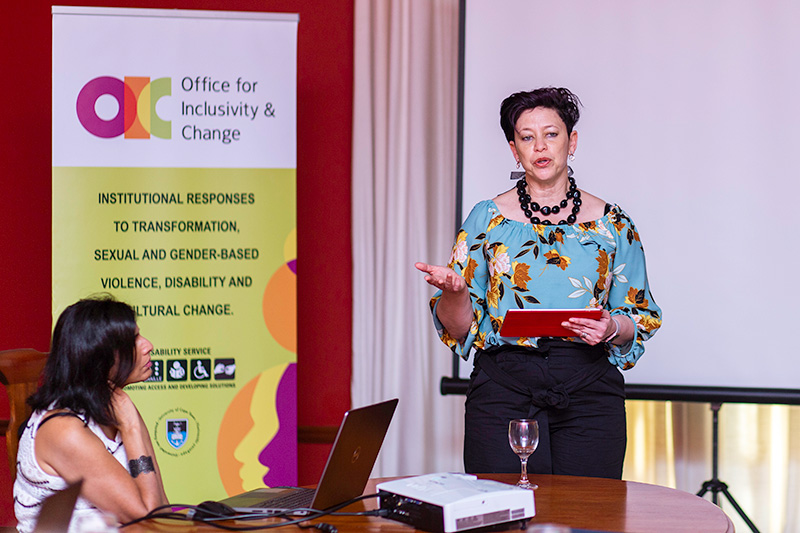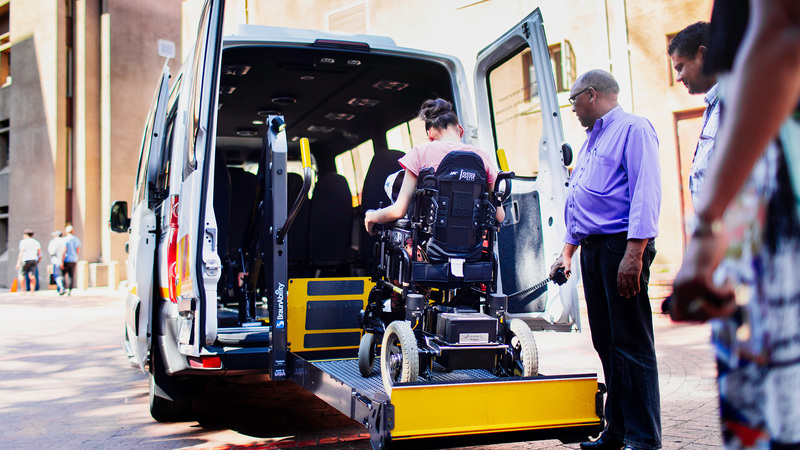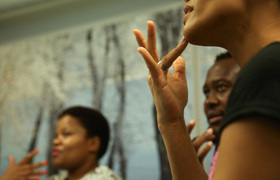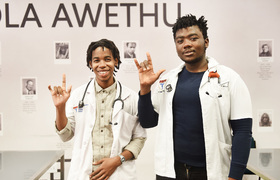Supporting students with disabilities
30 October 2018 | Story Kim Cloete. Photos Robyn Walker. Read time 9 min.University of Cape Town (UCT) students with disabilities are inspiring others with their stories of perseverance and resilience, and have expressed gratitude for the way they’ve been assisted with tailor-made support such as Braille readers and South African Sign Language interpreters.
In February this year, the FNB Fund (a part of the FirstRand Foundation) granted funding in excess of R11 million to the UCT Disability Service, aimed at supporting students who rely on the unit to thrive at university and excel academically.
The grant has allowed the Disability Service to appoint much-needed South African Sign Language interpreters, note takers and similar human support, as well as provide technical aids, improved transport and bursaries to assist students with both learning and physical disabilities.
Representatives of the foundation recently visited UCT and met with academic and support staff, and with students with a range of disabilities. The students talked about how assistive devices as well as financial and other support have helped them, inspiring them to focus on their studies and experience student life more fully.
Deputy Vice-Chancellor of Transformation Professor Loretta Feris explained how the support has been geared towards the individual needs of each student. Addressing staff, students and the donors, she said disability is often “the forgotten part of transformation in our society”, but that this should change.
Many students with disabilities grapple with layers of disadvantage, she said.
“If we want to ensure the success of all students, we need to ensure the equity of success of students with disabilities. Your partnership with UCT and the Disability Service has enabled us to deliver on our mission to ensure equity of access and equity of success,” Feris told the donors.
Manager of Disability Services Edwina Ghall said it is very important for the students to feel included.
“This is their space and we want them to own it and feel at home here. This is all about inclusion and we hope to bring about further change in this environment.”
“If we want to ensure the success of all students, we need to ensure the equity of success of students with disabilities.”
Personalised assistance
The partnership between the FNB Fund, a part of the FirstRand Foundation, and UCT is helping students in various ways.
A PhD student who was experiencing handwriting difficulties to the extent that she considered giving up her studies was helped with Dragon Naturally Speaking dictation software, enabling her to get back on track.
A low-vision mechanical engineering student has been using a Transformer HD magnifier to help with the technical drawings he needs for his course. Another visually-impaired student uses the portable Zoomax Snow 7 magnifier to access lecture materials.
A student using a wheelchair has been helped with a wheelchair bag in which to transport heavy books, while a master’s student who is blind will benefit from the recently purchased portable Orbit Braille reader.
The fund has also paid for a carer for a blind master’s student so that he can get to lectures and other venues. A Deaf student has the support of South African Sign Language interpreters. Students also have assistance from note takers in lectures and tutorials, as well as scribes during exams.
A number of students with disabilities have been supported by the fund through bursaries that include tuition fees, accommodation and a book allowance.
Psychology student Jamie Adams, who lost her right leg in a motorbike accident in 2013, said the staff of the Disability Service had been “an amazing” source of encouragement, while her bursary had helped immensely. She has also been able to write her exams in the Disability Service unit instead of in the usual exam venue, which has many steps to navigate.
Adams, who is doing her honours, is full of enthusiasm and is a role model to others. She has been admitted into the global Golden Key International Honour Society, a non-profit organisation based in the United States that recognises academic excellence, for being in the top 15% of her class.

Rising to the challenge
The Disability Service also assists students who have learning challenges, such as Tumishang Selamulela, who described how he had battled to keep up with the pace of his mechanical engineering degree.
“It had been my dream to come to UCT to study engineering. But it took me eight years to get to the end of a four-year degree. Eventually an educational psychologist determined that I had a learning disorder.”
Selamulela had other obstacles to overcome as well.
“Life was rough, living in Belhar far from campus, and I got to a point where I was struggling with funding.”
Encouraged by his perseverance, the Disability Service, with the help of funding from the FNB Fund, stepped in. He has been provided with accommodation near campus, his tuition has been paid and he is now allotted extra time for every exam.
“Somebody gave me a chance and I appreciate it. The extra time is a relief and it’s made such a difference to be close to campus as well. I am on a journey and I will get my degree. It’s given me new hope.”
The Disability Service recently acquired a new vehicle which will be adapted to transport students and staff with disabilities, making the unit the first at an academic institution in the Western Cape to provide accessible transport. The vehicle will supplement UCT’s nine-seater accessible bus, which can accommodate three wheelchairs, as well as another smaller vehicle.
Amy Sheldon, who is doing her honours in film and television studies and uses a wheelchair, says the accessible bus and other services have been a tremendous help. The FirstRand Foundation grant has helped to pay for her education, while also funding someone to take notes for her during lectures.
“UCT and the fund have helped me to follow my dream to be a university student and to further my studies,” she said.
Social investment
Charmaine Nondo, (FNB CSI Fund Manager) under the FirstRand Foundation, said the interaction with the students had been enlightening.
“We strongly believe that students should be educated in whichever field they choose and disability should not be a hindrance. Through speaking to the students, we’ve also realised that small changes and assistance can make a big difference on a day-to-day basis.”
Howard Arrand, Chairman of the FNB Fund, adds, “We are thrilled with the progress that Universities such as UCT are making in supporting students with disabilities; we are ever mindful of the immense need to invest in this space from early childhood development through to tertiary education.”
Monitoring and evaluation specialist Nyaradzo Mutanha, for Tshikululu Social Investments which administers the FirstRand fund, said she was moved by how students with disabilities have overcome obstacles and are pushing ahead with their studies.
She also hopes companies will help graduates get to the next level.
“From discussions, we realise that the biggest gap is the link between completing university and getting into the corporate world. We hope companies realise the great value of these students and employ … them when they graduate.”
The FirstRand Foundation has demonstrated a unique approach to partnership, said Dr Sianne Alves, director for the Office for Inclusivity and Change.
“[It] moves beyond financial contribution by emphasising how valuable it is for corporations to understand the needs of the recipients – even when those needs do not fit within the usual parameters of funding.
“The FirstRand Foundation has done more than provide funding. It has contributed towards the future of the students as academics and industry professionals. For this we are all thankful,” she said.
South Africa marks National Disability Rights Awareness Month in November.
 This work is licensed under a Creative Commons Attribution-NoDerivatives 4.0 International License.
This work is licensed under a Creative Commons Attribution-NoDerivatives 4.0 International License.
Please view the republishing articles page for more information.











